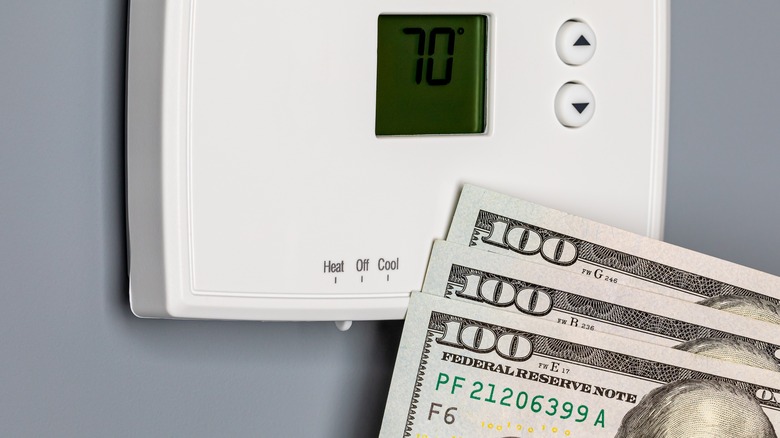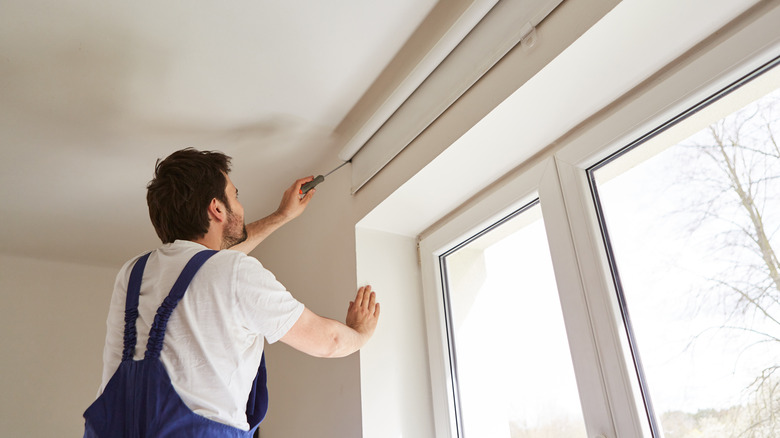The Biggest Pros And Cons Of Adding Smart Blinds To Your Home
We may receive a commission on purchases made from links.
Of the many ways you can smarten up your home's features, your blinds may not be high up the priority order. Most people begin the smart home transition with things like security systems, smart plugs, video doorbells, smart bulbs, and a smart thermostat, all of which individually are fairly inexpensive upgrades for the lasting impact they can have on your total comfort.
But you might want to keep smart blinds on your shopping list. The best smart blinds and shades, like this $150 set from Graywind that's available in more than a dozen styles, now add neat features like smartphone and voice control, in addition to the tried and true remote control. You may think it a trivial wish to mechanize your blinds, but depending on your home and your needs, it could be just as important an upgrade as all the rest, if not more so.
Raising your home's overall property value and strengthening its "coolness" rating is enough to consider adding smart blinds to your home, but there are several other benefits that you should factor into your buying decision. There are also some drawbacks, and because we like to call it right down the middle here, we'll clue you in on those as well.
Smart blinds are just plain convenient (and a necessitiy for some)
It might be obvious, but the sheer convenience of smart blinds is perhaps the biggest reason to buy them. Sure, it's easy enough to pick yourself up and turn a stick to adjust your exposure to warming daylight and stunning views, but why do that when a simple tap can set the mood? This can be especially handy for those who have bigger homes, where windows can be large and plentiful. It's fine if you're only concerned about the living room you're standing in, but what if you also need to tweak the blinds in the kitchen, dining room, and foyer? With smart blinds, you spend less time on menial tasks and more time enjoying the serene environment you've so carefully crafted.
For some people, smart blinds are much more than convenient. Some disabled folks may have trouble accessing the various blinds in their home. Whether they're wheelchair-bound or otherwise can't simply stretch and reach far enough to access the pulleys and sticks without risking injury, smart blinds would allow disabled homeowners to make all the changes they need without help or exerting excess energy. The multifaceted interfacing options are also key. Most smart blinds will come with a remote control and an accompanying smartphone app to make changes with a device that fits in your pocket. But with the added benefit of voice control in the newest sets, even those challenged by inactive motor function can manage their blinds.
You can potentially save money with smart blinds
Some smart blinds offer automatic timers that you can use to open and close them at specific times of the day; you can even buy some that automatically track the sun to adjust the blades according to its position. This is practically useful in many situations.
For starters, you can set them to close while you're gone to work for the day and have them open just as you return home, giving you peace of mind and privacy while you're away. You could also regulate how much sunlight you give certain plants within your home at specific times of the day, which can make all the difference between botanical life and death for certain fickle varieties.
But one big benefit to automating your smart blinds is saving energy in the summer. If you know your home is going to become a hotbox when the weather climbs above 90 degrees, you can have them close automatically near peak temperatures to block sunlight from worsening the situation. Working in concert with an automatic air conditioning system, this could result in positive net savings when the energy bill is due, as it won't have to work as hard to keep your home cool while you're away.
Smart blinds can get pretty expensive
The biggest drawback to installing smart blinds may be the most obvious, but it's no less true: they're simply more expensive. While your average set of blinds starts anywhere from $15 to $30 on Amazon, one set of smart blinds typically costs between $70 and $100, and that price can jump up to $200 depending on the materials, build quality, size, and added features (like voice control and automation).
And depending on the size of your home, that cost could multiply quite a bit. Considering that most people would want to buy these for several windows — likely for the biggest windows in their home — the upgrade could easily match or exceed the costs of other, more impactful smart home renovations. Although the energy-saving tip above may eventually help the blinds pay for themselves, the upfront expense could be just high enough for some to put the purchase off until they get some sort of financial windfall, perhaps during tax return season or from a timely work bonus.
There's a higher probability that your smart blinds break
The wonderful thing about ordinary blinds is that they should always just work — after all, it's essentially just a matrix of plastic, wooden, or felt-lined blades that you control with a string and rod. But as with anything mechanical, the more moving pieces you add, the higher chances you have for things to break. Especially when you incorporate electronics into the equation, it's likely (and almost inevitable) that your smart blinds may eventually malfunction, and the remedy won't be as simple as buying $5 worth of plastic.
Of course, these worries are offset by proper warranties and repair services, but it's something to think about. If you're going for a set that relies on a wireless connection for full functionality, you'll also need to mind your network etiquette. Most smart blinds play nicely and shouldn't need much digital maintenance after you set them up on your home network, but you might want to keep someone who is tech-savvy on speed dial if you aren't well-versed.
You could open yourself to security risks
Lastly, you might want to reconsider those smart blinds if you're particularly paranoid about your home security. While most people don't have the knowledge or desire to go around hacking smart home items, it's a possibility worth thinking through. Sure, a would-be attacker won't glean state secrets by hijacking your blinds, but it could allow them an easier peek into your home to assess valuables they can later steal or spy on you unawares.
Even though many of these smart home products claim strong, military-level encryption and security practices, we've seen time and again that they often have flaws and exploits of some nature, and some companies overstate the effectiveness of their security measures altogether. The only way to completely shield yourself from these concerns is to use something that doesn't connect to the internet or accept commands from a wireless remote, as even the latter option can put you at risk if someone found it worth the time and effort to target your home.





